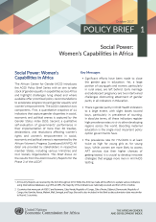Policy Brief 1 - Social Power: Women’s Capabilities in Africa

The African Center for Gender (ACG) introduces the AGDI Policy Brief Series with an aim to take stock of gender equality in capabilities across Africa and highlight challenges lying ahead and where available offer prioritized policy recommendations to accelerate progress toward gender equality and women’s empowerment. The AGDI is based on two components. First, a quantitative snapshot of 44 indicators that capture gender disparities in social, economic and political arenas is captured by the Gender Status Index (GSI). Second, a qualitative self-evaluation of governments’ performance in their implementation of more than 30 treaties, declarations, and resolutions affecting women’s rights and women’s empowerment in social, economic and political arenas is represented by the African Women’s Progress Scoreboard (AWPS). All data1 are provided by stakeholders in respective member States, including various Ministries and Civil Society Organizations. This Brief draws on the results from the AGDI Country Reports for the Phase 2 of the AGDI.
Key Messages
- Significant efforts have been made to close the gender gap in education. Yet, a large portion of young girls and women, particularly in rural areas, are left behind. Early marriage and adolescent pregnancy are two intertwined challenges obstructing attainment of gender parity in all indicators in Education.
- There is gender parity in Child Health indicators to a large extent, with slight biases toward boys, particularly in prevalence of stunting. In absolute terms, all these indicators register high prevalence rates vis-à-vis other developing regions across the world. Boosting maternal education is the single most important policy option governments have.
- The prevalence rate for HIV/AIDS is at least twice as high for young girls as for young boys. While women are more likely to access ART services due their higher chances of getting tested, it is crucial to develop innovate strategies that engage more men in HIV/AIDS testing.